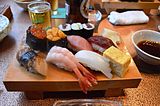Rettarianism
Rettarianism is the dietary practice of abstaining from the consumption of meat from animals that have not eaten another animal in turn. As such, it advocates for a form of semi-vegetarianism which limits the consumption of meat to that which fits a model of reciprocal justice, assigning a moral imperative to the killing of animals based on an equivalence between sapient hunting and that of predatory animals. Rettarians, in practice, primarily consume the meat of carnivorous animals when they do eat meat - such as a majority of commonly consumed seafood and more unconventional meat products such as meat from cats, bears and spiders. In the consumption of meat from omnivorous animals, such as pork, some adherents to a rettarian diet require confirmation that the animal has actually consumed meat, whilst more moderate practitioners argue in varying degrees that consuming omnivores fits within the diet's ethical framework due to the animal's potential for hunting.
| Rettarianism | |
|---|---|
   | |
| Description | |
| A diet which restricts consumption of meat to animals which consume meat. | |
| Related Dietary Choices | |
| Related diets | |
| Diet classification table | |
Terminology
Rettarianism originated as an exonym term by the early vegetarian movement of the 19th Century to describe the moral dietary practices of the Noorvic people. The term is a portmanteau of the Noorvic word "rettar" (meaning morally correct, "right") and the prelisting label of "vegetarian". As a descriptor, it did not enter into common usage amongst the Noorvic people until the popularization of vegetarianism in Vistaraland during the 1980s, spearheaded by the Moral Alliance for the Animals (Vistarian: Morele Alliantie voor de Dieren, MAVD). As the MAVD advocated for a number of diets which limited the "unethical consumption of animals", the emergence of adherents to a rettarian diet began to expand to outside the Noorvic community, further justifying a need for a term to describe it.
Prior to the popularization of the label of "rettarian", several other terms were used to describe the dietary practices of the Noorvic people. Within Noorvista itself, the pejorative "veefoob" (lit. 'A person who fears livestock') became the commonly used name for adherents to the diet amongst the Vistari-Noorvistan population, whilst academic and sympathetic sources used the term "dietary ethnicism". Amongst the Noorvic themselves, "skvalanderdieet" ("Noorvic diet") was used to describe it to outsiders, with those not following the custom referred to as having a "fistjänadieet" ("Vistarian diet"). The term "rettaräter", from "rettar" and "äter" ("eating") was also used, but was less common, and has previously been examined to have its use overstated due to its similarity to the modern term. During the popularization of vegetarianism, the practice often became viewed within the framework of pescetarianism, which saw the use of terms such as "Noorvic pescetarian", "pseudo-pescetarian" and "rettar-pescetarian" saw limited use. Such conflation was unpopular, both amongst the MAVD and Noorvic community, with the reasoning for a primarily seafood based diet coming from distinct, incompatible sets of criteria.
History
| This page (or section) is a work in progress by its author(s) and should not be considered final. |
Noorvic cultural practice
While there is not conclusive evidence on the exact period in which rettarian diets began to emerge amongst Noorvic communities, it is notably evidenced to have arose between the settlements of Ulvrikian people in modern day Vistaraland throughout the 1st Century and the conquest of the Noorvic by the Kingdom of Vierbaak in the 13th Century. Anthropologists theorize that the propagation of a strong fishing culture, justified by a moral aversion to the use of livestock as an immoral and sedentary practice. According to early Vistari writings on the Noorvic states, the animosity towards livestock farming emerged from the unethical nature of entrapping animals for the duration of their lives for the sole purpose of consumption, and the incompatibility of such exploitation of the defenceless with the Gamalltru concept of a warrior spirit.
Under Vistari rule, the practice became less all-encompassing, and a considerable portion of the Noorvic population elected to accept the the inclusion of pork and other meat products into their diet. Abandoning such practices was more common in mixed communities and Vistari-dominated cities, with the Noorvic-dominated pockets of settlements in the countryside proving more resilient in adopting Vistari culinary practices. Due to this, differences in the degree to which the diet was adhered to emerged, with some communities entirely decrying the consumption of even omnivorous animals as a moral failing.
With the emergence of the Viktorist movement in the 18th century, several high-ranking figures within the church expressed approval of the diet as a a showing of moral strength through temperance, and began a practice of Viktorist clergymen adhering to the diet and rettarian food being provided by Viktorist churches. The diet never became formal policy of the church, nor was it an expectation of the common Viktorist to be abstaining from meat, however the religious endorsement of the practice is argued to have been instrumental in encouraging acceptance and continuation of the diet. This included the voluntary introduction of specialized labelling of pork products in which the animal was raised consuming meat within Noorvista in order to allow stricter rettarians to safely consume the animal without ambiguity on if it complied with their dietary restrictions.
In the 20th century, there was noted to be an uptick in rettarianism amongst Noorvic communities in Northern Vistaraland, notably in the province of Adliausirijk - corresponding with a revival of Noorvic nationalist sentiments. Nationalistic groups, such as the Noorvic Socialist Revolutionary Party and Veitård, promoted the adoption of the diet as a reaffirming of cultural values subject to Vistari assimilation. The latter group, as the right-wing of the Noorvic nationalist movement, began to petition the Viktorist churches of Noorvista to finally establish the diet as official policy - though such a movement faced opposition by the Vistari-Noorvistan members, and was eventually dropped.